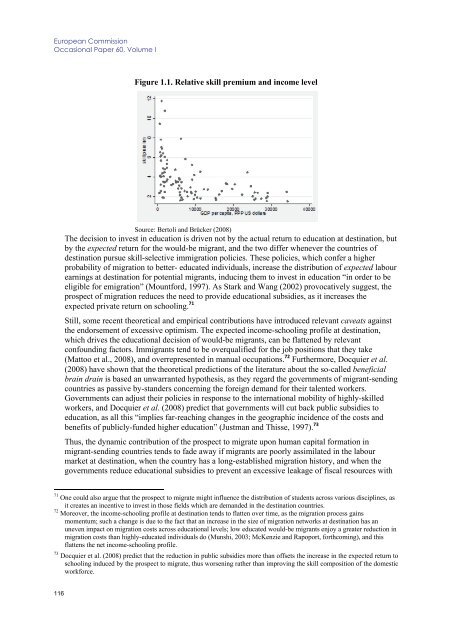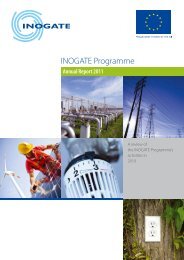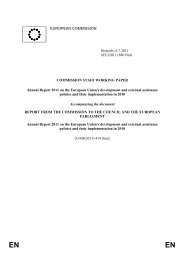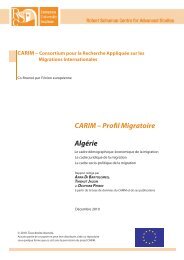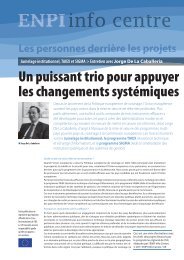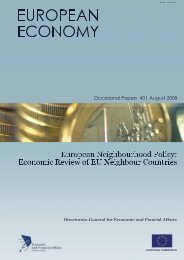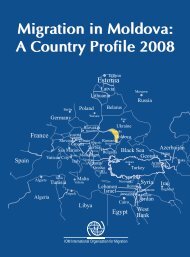<strong>European</strong> CommissionOccasional Paper 60, Volume IFigure 1.1. Relative skill premium <strong>and</strong> income levelSource: Bertoli <strong>and</strong> Brücker (2008)The decision to invest in education is driven not by the actual return to education at destination, butby the expected return for the would-be migrant, <strong>and</strong> the two differ whenever the countries ofdestination pursue skill-selective im<strong>migration</strong> policies. These policies, which confer a higherprobability of <strong>migration</strong> to better- educated individuals, increase the distribution of expected labourearnings at destination for potential migrants, inducing them to invest in education “in order to beeligible for e<strong>migration</strong>” (Mountford, 1997). As Stark <strong>and</strong> Wang (2002) provocatively suggest, theprospect of <strong>migration</strong> reduces the need to provide educational subsidies, as it increases theexpected private return on schooling. 71Still, some recent theoretical <strong>and</strong> empirical contributions have introduced relevant caveats againstthe endorsement of excessive optimism. The expected income-schooling profile at destination,which drives the educational decision of would-be migrants, can be flattened by relevantconfounding factors. Immigrants tend to be overqualified for the job positions that they take(Mattoo et al., 2008), <strong>and</strong> overrepresented in manual occupations. 72 Furthermore, Docquier et al.(2008) have shown that the theoretical predictions of the literature about the so-called beneficialbrain drain is based an unwarranted hypothesis, as they regard the governments of migrant-sendingcountries as passive by-st<strong>and</strong>ers concerning the foreign dem<strong>and</strong> for their talented workers.Governments can adjust their policies in response to the international mobility of highly-skilledworkers, <strong>and</strong> Docquier et al. (2008) predict that governments will cut back public subsidies toeducation, as all this “implies far-reaching changes in the geographic incidence of the costs <strong>and</strong>benefits of publicly-funded higher education” (Justman <strong>and</strong> Thisse, 1997). 73Thus, the dynamic contribution of the prospect to migrate upon human capital formation inmigrant-sending countries tends to fade away if migrants are poorly assimilated in the labour<strong>market</strong> at destination, when the country has a long-established <strong>migration</strong> history, <strong>and</strong> when thegovernments reduce educational subsidies to prevent an excessive leakage of fiscal resources with71 One could also argue that the prospect to migrate might influence the distribution of students across various disciplines, asit creates an incentive to invest in those fields which are dem<strong>and</strong>ed in the destination countries.72 Moreover, the income-schooling profile at destination tends to flatten over time, as the <strong>migration</strong> process gainsmomentum; such a change is due to the fact that an increase in the size of <strong>migration</strong> networks at destination has anuneven impact on <strong>migration</strong> costs across educational levels; low educated would-be migrants enjoy a greater reduction in<strong>migration</strong> costs than highly-educated individuals do (Munshi, 2003; McKenzie <strong>and</strong> Rapoport, forthcoming), <strong>and</strong> thisflattens the net income-schooling profile.73 Docquier et al. (2008) predict that the reduction in public subsidies more than offsets the increase in the expected return toschooling induced by the prospect to migrate, thus worsening rather than improving the skill composition of the domesticworkforce.116
Chapter IIThe impact of <strong>migration</strong> on labour <strong>market</strong>s in Arab Mediterranean countriesthe <strong>migration</strong> of the highly educated workers. If this is the case, then the static negative effect dueto the drain of the “best <strong>and</strong> the brightest” is unlikely to be offset by a substantial positive dynamiccontribution to human capital formation. Nevertheless, this need not represent an actual concern formigrant-sending countries: if the domestic economy is unable to productively employ talented thentheir <strong>migration</strong> would not represent a worrying brain drain but it would rather be the consequenceof a substantial mismatch between the higher-education system <strong>and</strong> the domestic labour <strong>market</strong>. 74The <strong>migration</strong> of skilled workers would thus alleviate the pressure on the labour <strong>market</strong>, rather thanrepresent a hindering factor in economic development.1.3 Return <strong>migration</strong>Return <strong>migration</strong> is currently depicted as one of the main channels through which migrant-sendingcountries can benefit from <strong>migration</strong> <strong>flows</strong>, as migrants can acquire higher education or relevant onthe-jobexperiences when abroad, <strong>and</strong> then employ them fruitfully upon their return. This statement(which applies mainly to scarce skills) should be mitigated, or even criticized: for example, thegovernment of Egypt now fears that the current economic crisis in the Gulf will result in a massivereturn of migrants to Egypt, <strong>and</strong> an upsurge in unemployment. Return <strong>migration</strong> is advocated by EUmember states as an implicit solution to their problem of integration <strong>and</strong> social cohesion, not tosending countries’ problem of development. The influence on the supply side of the labour <strong>market</strong> isdirect if returnees complete their <strong>migration</strong> experience while they are still in their working lives. Suchan effect is relevant if temporary – or circular – rather than the permanent <strong>migration</strong> representing thepredominant pattern of international mobility of domestic workers.1.4 RemittancesRemittances can influence the supply side of the labour <strong>market</strong> through a variety of channels. Thereceipt of remittances loosens the liquidity constraints that hinder investments in education (CoxEdwards <strong>and</strong> Ureta, 2003; Rapoport <strong>and</strong> Docquier, 2006). Note that this argument is closely related tothe one that was depicted in section 1.1.1, as young members of recipient households have a higherprobability of migrating than the rest of the population (van Dalen et al., 2005), due to already existingfamily networks in the country of destination. Thus, whether the positive income effects determined bythe receipt of migrant remittances feeds up into a higher investment in education depends crucially onwhether the prospect to migrate improves or worsens the incentives to undertake such an investment. 75Remittances reduce – in the short run – the size of the younger cohorts entering the labour <strong>market</strong>,either through a higher retention rate in the educational system, or through increased <strong>migration</strong>.Remittances can also produce a detrimental impact on human-capital formation, if they open upopportunities to undertake productive investments in family-run activities, which represent the use ofthe remittances that are supposed to deliver the greatest developmental contribution for the recipientcountries (see Taylor, 1999 for a criticque of this position). Child workers are mostly employed infamily-run economic activities – <strong>and</strong> all the more so in rural areas, <strong>and</strong> remittance-financed productiveinvestments can lead to an increase in the household dem<strong>and</strong> for child work. Child work <strong>and</strong> schoolingare not mutually exclusive, but are, nevertheless, conflicting activities (Ravallion <strong>and</strong> Wodon, 2001), sothat an increase in the household dem<strong>and</strong> for child work could have a detrimental impact on schoolattendance.74 Pritchett (2001) questions, on empirical grounds, the compelling theoretical argument that a larger endowment of humancapital is conducive to a more robust rate of economic growth.75 If the former is the case, then the receipt of remittances delays the entrance of young cohorts to the domestic labour <strong>market</strong>,as they raise the enrollment rates in higher-education institutions; in the medium run, this would improve theskill-composition of the labour force. If, on the other h<strong>and</strong>, the prospect to migrate reduces the incentives to invest ineducation, remittances could be used to finance the <strong>migration</strong> cost for an additional household member.117
- Page 5 and 6:
STUDYLABOUR MARKETS PERFORMANCE AND
- Page 7 and 8:
Table of ContentsLABOUR MARKETS PER
- Page 10:
8.1 Actual migration and consumptio
- Page 15 and 16:
Chapter IFinal Report 15 MILLION NE
- Page 17 and 18:
Chapter IFinal Report …so that MI
- Page 19 and 20:
Chapter IFinal Reportroots). The cu
- Page 21 and 22:
Chapter IFinal Report In AMCs, REMI
- Page 23 and 24:
Chapter IFinal Reportpolicies. This
- Page 25 and 26:
Chapter IFinal ReportMediterranean
- Page 27 and 28:
Chapter IFinal ReportMore recently,
- Page 29 and 30:
Chapter IFinal Reportfor EU employm
- Page 31 and 32:
Chapter IFinal Reportchosen, these
- Page 33 and 34:
Chapter IFinal Reportexit of women
- Page 35 and 36:
Chapter IFinal ReportFigure 1.2.1.
- Page 37 and 38:
Chapter IFinal ReportA Declining Em
- Page 39 and 40:
Chapter IFinal ReportThe same year,
- Page 41 and 42:
Chapter IFinal ReportTable 2.2.1. I
- Page 43 and 44:
Chapter IFinal Reportminimum wages
- Page 45 and 46:
Chapter IFinal Report2.4 Unemployme
- Page 47 and 48:
Chapter IFinal ReportYouth Unemploy
- Page 49 and 50:
Chapter IFinal ReportBut one should
- Page 51 and 52:
Chapter IFinal Reportmillion) 10 .
- Page 53 and 54:
Chapter IFinal Reportmight intensif
- Page 55 and 56:
Chapter IFinal Reporttrue labour ma
- Page 57 and 58:
Chapter IFinal Reportto reform the
- Page 59 and 60:
Chapter IFinal ReportFrom a differe
- Page 61 and 62:
Chapter IFinal ReportTable 4.2.1 Ou
- Page 63 and 64:
Chapter IFinal ReportSource: Adams
- Page 65 and 66:
Chapter IFinal Reportin the destina
- Page 67 and 68: Chapter IFinal ReportIn conclusion,
- Page 69 and 70: Chapter IFinal Reportorganised in B
- Page 71 and 72: Chapter IFinal Reportsecond Intifad
- Page 73 and 74: Chapter IFinal Reportstands at 29.7
- Page 75 and 76: Chapter IFinal Reportconstruction w
- Page 77 and 78: Chapter IFinal ReportAs far as the
- Page 79 and 80: Chapter IFinal Reportother cases, l
- Page 81 and 82: Chapter IFinal Reportunemployment a
- Page 83 and 84: Chapter IFinal Reportof Egypt, so f
- Page 85 and 86: Chapter IFinal ReportWhile progress
- Page 87 and 88: Chapter IFinal ReportThese reservat
- Page 89 and 90: Chapter IFinal ReportAs Figure 6.3.
- Page 91 and 92: Chapter IFinal Reportin skill devel
- Page 93 and 94: Chapter IFinal ReportThe Directive
- Page 95 and 96: Chapter IFinal ReportThe need for
- Page 97 and 98: Chapter IFinal Reportobjectives are
- Page 99 and 100: Chapter IFinal Reporttrue Euro-Medi
- Page 101 and 102: Chapter IFinal Report- Putting empl
- Page 103 and 104: Chapter IFinal Report promotion of
- Page 105 and 106: Chapter IFinal ReportOtherADAMS, R.
- Page 107 and 108: Chapter IFinal ReportDE BEL-AIR, F.
- Page 109 and 110: Chapter IFinal ReportGUPTA, S., C.
- Page 111 and 112: Chapter IFinal ReportOECD (2000): M
- Page 113 and 114: Chapter II - Thematic Background Pa
- Page 115 and 116: Chapter IIThe impact of migration o
- Page 117: Chapter IIThe impact of migration o
- Page 121 and 122: Chapter IIThe impact of migration o
- Page 123 and 124: Chapter IIThe impact of migration o
- Page 125 and 126: Chapter IIThe impact of migration o
- Page 127 and 128: Chapter IIThe impact of migration o
- Page 129 and 130: Chapter IIThe impact of migration o
- Page 131 and 132: Chapter IIThe impact of migration o
- Page 133 and 134: Chapter IIThe impact of migration o
- Page 135 and 136: Chapter IIThe impact of migration o
- Page 137 and 138: Chapter IIThe impact of migration o
- Page 139 and 140: Chapter IIThe impact of migration o
- Page 141 and 142: Chapter IIThe impact of migration o
- Page 143 and 144: Chapter IIThe impact of migration o
- Page 145 and 146: Chapter IIThe impact of migration o
- Page 147 and 148: Chapter IIThe impact of migration o
- Page 149 and 150: Chapter IIThe impact of migration o
- Page 151 and 152: Chapter IIThe impact of migration o
- Page 153 and 154: Chapter IIThe impact of migration o
- Page 155 and 156: Chapter IIThe impact of migration o
- Page 157 and 158: Chapter IIThe impact of migration o
- Page 159 and 160: Chapter IIThe impact of migration o
- Page 161 and 162: Chapter III - Thematic Background P
- Page 163 and 164: Chapter IIIEU Migration Policy towa
- Page 165 and 166: Chapter IIIEU Migration Policy towa
- Page 167 and 168: Chapter IIIEU Migration Policy towa
- Page 169 and 170:
Chapter IIIEU Migration Policy towa
- Page 171 and 172:
Chapter IIIEU Migration Policy towa
- Page 173 and 174:
Chapter IIIEU Migration Policy towa
- Page 175 and 176:
Chapter IIIEU Migration Policy towa
- Page 177 and 178:
Chapter IIIEU Migration Policy towa
- Page 179 and 180:
Chapter IIIEU Migration Policy towa
- Page 181 and 182:
Chapter IIIEU Migration Policy towa
- Page 183 and 184:
Chapter IIIEU Migration Policy towa
- Page 185 and 186:
Chapter IIIEU Migration Policy towa
- Page 187 and 188:
Chapter IIIEU Migration Policy towa
- Page 189 and 190:
Chapter IIIEU Migration Policy towa
- Page 191 and 192:
Chapter IIIEU Migration Policy towa
- Page 193 and 194:
Chapter IIIEU Migration Policy towa
- Page 195 and 196:
Chapter IIIEU Migration Policy towa
- Page 197 and 198:
Chapter IIIEU Migration Policy towa
- Page 199 and 200:
Chapter IIIEU Migration Policy towa
- Page 201 and 202:
Chapter IIIEU Migration Policy towa
- Page 203 and 204:
Chapter IIIEU Migration Policy towa
- Page 205 and 206:
Chapter IIIEU Migration Policy towa
- Page 207:
Chapter IIIEU Migration Policy towa


